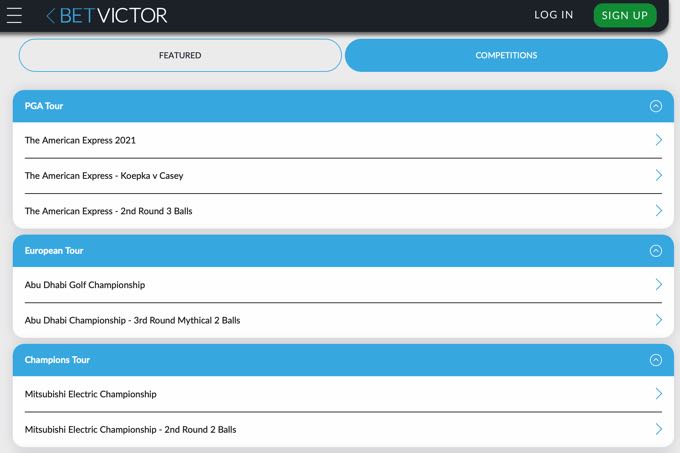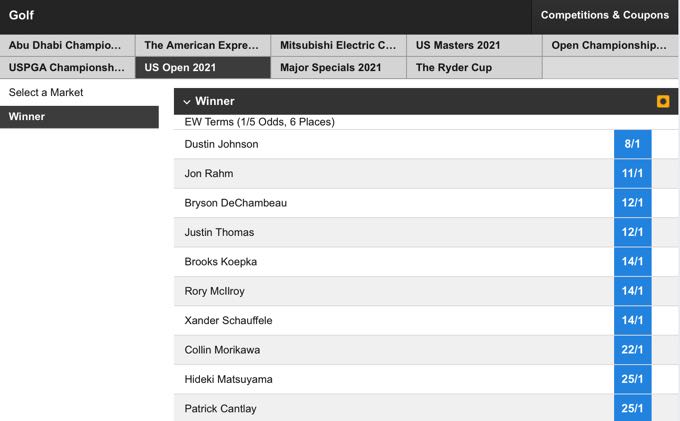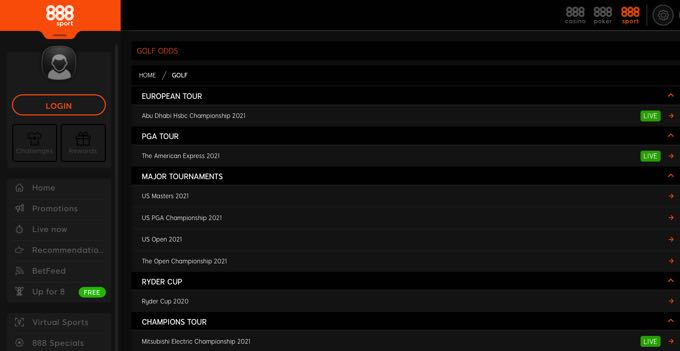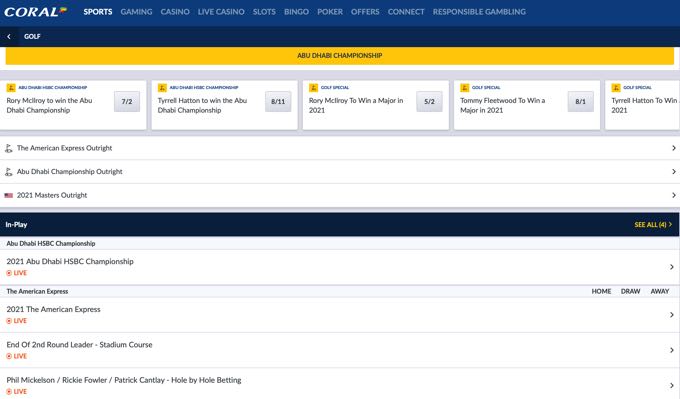Golf can be both a thrilling and an infuriating game to watch, let alone what it’s like to play. Swinging a club at a ball and hoping that you can send said ball exactly where you need it to be is always likely to be an annoying pastime, no matter how good you are at it. When you’re watching someone else do that and hoping that they can do it well in order to help your bet, that sense of infuriation and helpless increases exponentially.
In essence, it’s a simple game, requiring players to move a golf ball around a course using only the selection of clubs in their bag. That simple description underlies the complexity of the sport, however, as anyone who has ever played it will know full-well. You can happily place a bet on a player that has been leading since day one, only to see them collapse on day three of the tournament, proving why we lose and hate it in equal measure.
The Best Bookies for Golf
It’s totally fair to look at different bookmakers and feel as though some of them are better at covering certain topics than others. Elsewhere on this site, for example, I’ve explained why it is that Paddy Power are the cream of the bookmaking when it comes to novelty bets on markets such as Christmas number ones and Royal weddings. Here I’ll explain which bookies I think are best for golf as well as why I think it.

BetVictor
I’m a big fan of BetVictor in general, with their website being one of my favourites to use when the opportunity presents itself. Their mobile app is similarly enjoyable, for the record, so I’d recommend that you give them both a go if you haven’t already. Of course a good website and app aren’t enough in and of themselves to mean that you would use a bookmaker for a specific sport, so what is it about BetVictor’s coverage that I think lends itself to golf? One of the big things is that they don’t just cover the main tournaments and then forget about the rest of them. Casual observers of the sport might think that the only events worth thinking about are the likes of the British and US Open and the Ryder Cup, but bettors will want to be able to have a flutter on so much more than that.
Thankfully, BetVictor agrees. Both the PGA Tour and the European Tour have countless smaller tournaments taking place throughout the world at any given moment that a clever bettor would want to get in on the action of. Bizarrely, the European Tour is also responsible for the likes of the Australian PGA Championship, which regular welcomes the likes of Adam Scott and Sergio Garcia. Checking out the field of an event like that as well as the form of the bigger guns who tend to participate in it will give you a chance to have a bet on something that the bookies might only be casting half an eye over. That BetVictor offers odds on so many of these more incidental tournaments should only be seen as a good thing.
It’s also important to say that BetVictor’s ante-post coverage of the bigger tournaments is excellent. You can expect to find odds on the likes of the Ryder Cup, the USPGA Championship and the US Masters a year or so in advance, for example. Obviously ante-post betting is always slightly risky, but if you’ve been paying attention to those smaller tournaments that have been taking place throughout the year then you’ll have a good idea of which golfers are in a decent frame of mind heading into the bigger ones. The small tournaments are where you’ll learn what you need to do for the season, but the big ones are where you’ll want to get your betting spot on.

Betfair
Betfair only launched their fixed-odds sportsbook in 2012, so in relative terms they’re one of the youngest ‘big’ bookies on the market. Part of the reason they left it so late was the popularity of their Exchange, the betting service that essentially lets punters play the role of the bookmaker. That’s an idea way of betting when it comes to golf, with the size of the field meaning that betting against one player can sometimes be a better method than betting for another. I won’t bother going into too much detail about how the Exchange works here, but basically you can choose to ‘Lay’ a given participant, which means that you think they definitely won’t win. As long as someone else lifts the trophy at the end of the competition, you’ll be a winner. Ideal for the likes of golf and horse racing.
They do have a sportsbook, though, and it’s impressive enough to be deserving of a mention. Within each of the events that you’ll be wanting to bet on you’ll find plenty of interesting different options, too. Looking ahead to the Hero World Challenge tournament, for example, I can see standard odds for the players I think might win, as well as odds for the ‘Big Guns’ against the field. In this instance, the ‘Big Guns’ consist of Jordan Spieth, Dustin Johnson, Rickie Fowler and Justin Thomas. Taking the lead from the company’s Exchange, this bet would allow me to have a wager on either those four popular golfers or everyone else taking part in the tournament. It makes things a little bit more exciting for me, as well as giving me a better chance of winning.
That’s not the only variation on the usual theme offered up by Betfair. I could have a bet on who I think will finish as the top English player, say, or the top player from the USA. I could bet on the leader after the first round or have a wager on who the winner would be without Spieth, Johnson and Thomas in the running. They’re the sort of bets that make the whole thing slightly more interesting and, whilst similar offerings are put forward by other bookies, Betfair do them really well. They know their audience and they come up with bets that will appeal accordingly. You’ll either like that sort of thing or you won’t, but if you do then you’ll know the bookmaker to go to.

888sport
There’s one big reason why 888Sport are on my list of decent bookies for golf betting: their odds. Looking at betting for the First Round Leader of the Hero World Challenge, 888Sport either have the best odds or match the best odds for more than half of the field. That’s pretty impressive by anyone’s standards and it’s not the sort of thing that’s limited to only the more unusual of events. This is a company that wants to be competitive, to be thought of in the same breath as the likes of the more well known bookmakers. That’s why they’re going so hot and heavy over decent odds for sports that are slightly less popular than football, tennis and the like. After all, if you’re unlikely to win an arms race across all sports then why not go big on specific ones?
888Sport have a website that I love so I’m always going to be slightly more inclined to lean towards them when it comes to who I recommend betting with. That said, they match an intuitive site with plenty of odds on more interesting markets than some of their competitors. It’s all well and good covering both the major and the minor tournaments from the year, but what about the likes of who will end the year as the world number one? Wouldn’t it be good to have a bet on how many Majors you think a specific golfer will pick up over the course of the year? 888Sport have you covered on both fronts, plus many more besides.
They match all of the above up with a really impressive ante-post market on the major tournaments, such as the Open and the Masters, even looking as far as two years ahead if you fancy betting on something like the Solheim Cup. They do disappoint a little bit when it comes to the sheer number of golfing events that they cover, but that’s why I recommend a number of different bookies here. If you want to bet on loads of different tournaments then look somewhere else, but if you want decent odds and a some interesting markets then 888Sport will do you just nicely.

Coral
As I’ve started this theme of highlighting what each bookie does that’s slightly better than their competitors, I really should finish it with Coral. Without question their number one boast that you’ll be wanting to take advantage of if you’ve got any sense is their archive of past results. You can do a search based on something as specific as a given tournament or as vague as a selected fourteen day period and Coral will tell you who won what market from a year ago. That’s the ideal tool when it comes to deciding on whether particular golfers play well on particular courses or in particular events, which can be a good indicator to tell you who to bet on and when.
Looking back at previous tournaments from throughout the year is a handy guide to who might play well in upcoming events, but it’s not the be-all and end-all in terms of what makes a bookmaker a decent company to bet with. Coral know that, of course, so they also match the top dogs in other areas such as the number of events they cover and the state of their In-Play betting system. Another way that Coral take the game to their competitors is with their golfing promotions, which they run regularly and that will likely catch your eye. One of the main things to look out for is extra places on Each-Way bets in the big tournaments; an offer that might well earn you a decent penny if you take advantage.
Coral are, perhaps, the best all-round bookmaker when it comes to betting on golf. Their market depth is decent without being exceptional, with the same able to be said about their odds and their In-Play betting system. Their promotions are solid without being overly exciting and their variation of bets will keep most punters happy enough. If you’re looking for a bookie that does everything I’ve mentioned in good enough style then Coral will tick all of your boxes. If you want something a little bit more interesting then I’d recommend mixing and matching from all of the companies on this list.
Betting on Golf

A.A. Milne once said, “Golf is so popular simply because it is the best game in the world at which to be bad”. Bobby Jones, meanwhile summed up the experience of most golfers when he said, “Golf is a game that is played on a five-inch course — the distance between your ears”. Anyone who’s ever played golf will know that it is more challenging than virtually any other sport because you have time to think about what you’re doing. That’s also what makes betting on it as a sport simultaneously so exciting and so frustrating. You can have a flutter on a player who has won the last three tournaments he’s entered, only for him to get into his own head this time around and for your bet to fall apart.
That’s what makes betting on golf so tempting: the notion that even when your selection is behind he could still finish ahead. Imagine how folks who had placed a bet on Paul Lawrie must have felt as the Scot was heading into the final round of the Open Championship weekend in 1999. He was ten shots down on the leader Jean van de Velde, with the Frenchman boasting a three-shot lead as he prepared to tee off on the eighteenth. He ended up registering a triple-bogey, with the match going into a play-off that Lawrie subsequently won. Bettors would have been tearing up their betting slips at one point, only to be sellotaping them back together as he achieved the biggest final round comeback in the history of the British Open.
Golf is a game that lends itself to every aspect of the betting market. Ante-post wagers are the most common and the most popular, but actions like those of van de Velde have long meant that In-Play markets are as popular as those invested in before a ball is hit. In team sports such as football and rugby there are so many variables that it’s easy to get into the mindset of feeling as though anything can happen. In sports like tennis the action happens so quickly that the players don’t really have time to think about their actions, meaning that it’s unlikely they will get into their own heads. In golf, though, players have nothing but time to give themselves the yips, with punters potentially able to watch it happen in real time. No wonder it’s such a popular sport to bet on!
How to Bet on Golf

There are certain markets and bets that you’ll want to keep an eye out for when it comes to betting on golf. Here I’ve had a look at the key areas that will interest most people and explained what it all means.
Tournament Betting
Perhaps the most popular type of bet when it comes to golf is tournament betting. In very simple terms, this is like betting on the winner of the FA Cup at the start of the season, say, or placing a wager on who will win Wimbledon. What you’re doing is having a think about the player that is most likely to win any given tournament, such as ‘Rory McIlroy to win the British Open’. As I mentioned in my explanation about Coral, this is where previous form in the various tournaments can tell you a lot about what you’re betting on.
Though home advantage definitely plays a part when it comes to betting on something like football or rugby, golf is more akin to tennis in the sense that the type of ground that a tournament is played on is more likely to dictate how well or badly a player will do. Traditionally, for example, Americans don’t play as well on links courses as their European counterparts. That’s because the weather will affect a links course in a way that courses in the States are rarely affected, with winds whipping in off the sea and rain chucking down heavily. It’s no coincidence that Tiger Woods won the British Open at the Royal Liverpool in 2006 at a time when Merseyside was enjoying an unprecedented heat wave. The weather, therefore, is something else you’ll want to think about when betting on a tournament winner.
Each-Way Betting
When you’re betting on the winner of a tournament you’ll want to explore which bookies give you the largest amount of places for Each-Way bets. The best way to think about that is like a horse race, with the possibility quite high that your chosen player could finish third or fourth instead of in the top-spot you were hoping for. If you’ve placed your bet with a bookie that will pay out on Each-Way bets for the first six places then you’re golden, but if they only offer the first two or three then you might end up disappointed.
Winning Margin
If you’ve got a golfer that is in the form of their life then you might not get particularly long odds from the bookies for them winning an upcoming tournament. One way that you can look to extend those odds is by adding in another variable like how big their winning margin will be.
Let’s say you fancy Jason Day to romp home in the Australian Open, you could stretch the odds you get offered by saying that he’ll win by three or more shots. If Day finishes the tournament seven under-par and the next closest competition only manages to get to three under then you’ll have won your bet, as well as a nice little payout.
Nationality of Top Player
There’s a specific thing in golf that is summed up by the Ryder Cup, which is the battle for supremacy between Europe and the United States. Though there have been plenty of exciting golfers from other parts of the world, with Greg Norman and Masashi Ozaki from Australia and Japan springing immediately to mind, the vast majority of winners have come from either the US or the continent. That’s why plenty of bookmakers will give you the chance to have a bet on the country of origin of the winner of most tournaments.
This theme can be extended to include the likes of country of origin of the winner of the first round or even something much longer, such as the nationality of the world number one at the end of the year. What makes things even more interesting on that front is the sheer number of nations that are producing top golfers nowadays. Yes, the US and Europe lay claim to many, but don’t forget that within Europe there are countless different member states that a winning golfer could come from. Sweden, Spain, Northern Ireland and England all have representatives in the top ten golfers in the world list at the time of writing, to say nothing of Australia, Japan and South Africa boasting players that can at least challenge from time to time.
2-Ball & 3-Ball Betting
The unique thing about golf as a sport is that the players will often take to the course in different groupings depending on the rules of the tournament. It’s not unusual in the early days of a competition, for example, for players to be sent out in groups of three to play their first couple of rounds. By the time the tournament gets to the business end you’ll normally find that those groups have been reduced to twos, normally because the cut has separated the wheat from the chaff. That’s an interesting side of the machinations of the game, but it’s also great because it gives you more options as a bettor.
Betting on 2-ball and 3-ball golf is a separate way of placing a wager to simple tournament betting. In the latter you’re placing a bet on who you think will win the competition overall, whilst with the former you’re simply having a flutter on who will win between the two or three golfers that are in the individual grouping. The reason that matters is that Player X could beat the other player in his group by three-shots over the course of a day’s golf, but Player Y might have had a six-shot leader over him before a ball was hit and still go on to win the tournament. A 2-ball bet on Player X would be a winner, therefore, even if a tournament bet on him would have been a loser.
Who Will Make or Miss the Cut
Though this is far from set in stone, most golf tournaments take place between Thursday and Sunday. Players will enjoy thirty-six holes of golf over the first two days of the competition and during that time a ranking system will develop. The players will be ordered according to how many shots they’ve taken over the first two days of play and at the end of the Friday a ‘cut’ will take place. This is because the majority of events only have a certain number of positions that will earn a payout and those that aren’t going to receive anything will be removed from play. Say the cut is at twenty and there were fifty players that entered the tournament, the bottom thirty competitors according to the results at the end of the Friday won’t ‘make the cut’ and will not play on the Saturday or Sunday.
Now that you know that it’s probably quite easy to figure out what betting on the cut amounts to. You’re basically trying to figure out whether a given player will score well enough on the first two days of a tournament to be asked to play in the second two days. It sounds simple enough and, in essence, it is. But it’s worth bearing in mind that some of the biggest names in golf have missed out on cuts that most people thought they’d walk through. Jim Mickelson, for example, had made the cut in every US PGA Championship he’d played in for twenty-two years until he missed it in 2017. A sign, should you need it, that you need to think carefully when lining up your bets on this market.
Rules to Be Aware Of

The above is a far from finite list of decent wagers that you’ll want to consider when it comes to betting on golf. Alongside them, however, are a couple of rules that you’ll want to make sure you keep your eye out for when you’re reading the small print of a bookmaker’s golf coverage.
Dead Heat
Dead Heat rules are applicable in the majority of sports, but when it comes to golf it’s perhaps more common than anywhere else for this to be a reality. That’s because all golf tournament organisers are bothered about is finding a winner, with nobody but the participants themselves being interested in who finishes second or third. If you’ve placed an Each-Way bet on a player who finishes tied for third, however, you’ll almost certainly want to know whether or not your bet will be paid out on by the company you placed it with.
You will never have a Dead Heat for the winner of the tournament, with organisers normally asking the competitors tied for first to play an extra couple of holes in order to determine the winner. When it comes to Each-Way bets, on the other hand, things can be a touch more complicated. A simple rule of thumb is that your stake will be divided by the number of competitors who are tied for the finishing place. Let’s say that you’ve placed your bet at 16/1 and the bookie is paying out at terms of 1/4. That will mean 16/1 divided by four, which is 4/1. You’ve then got two competitors vying for the final Each-Way spot, so your stake will be split in half. Say you placed a stake of £10, it will now be £5 on odds of 4/1, which means you’ll be paid £20.
That’s a nice and easy example, but say there were six competitors who all finished tied for second-place and the bookmaker you placed your bet with is only paying out on the top five places. Well, you’d remove the winner as he won it outright and you’ll then need to divide those four places by the six players, which is 0.67. That is the equivalent of 67 pence to the pound, meaning a £10 bet is now worth £6.70. Had the odds been 16/1 again and with a 1/4 payout on Each-Way bets, you’ll now be looking at odds of 4/1 with a stake of £6.70, which means your winnings will be £26.80. Hope that’s at least slightly clearer!
Abandoned Events
The final thing I’ll tell you about is a how a bookmaker deals with abandoned events when it comes to golf. There are any number of reasons why a golf tournament might be abandoned, with the likes of weather being one of the major culprits. Golfers are used to playing in the rain, as an example, but lightning is another thing entirely and one that tournament organisers are unwilling to ask competitors to play in. Let’s say, therefore, that a storm has hit and the tournament you’ve bet on ends up being cancelled, what happens to your bet?
Typically speaking all bets that have not already been settled will be declared void when the tournament is abandoned. What I mean by that is that if you placed a bet on who would be leading at the end of Day One and the tournament is abandoned on Day Three then you won’t get your money back for that bet. If, on the other hand, you’ve placed a tournament winner bet then that will be made void unless the tournament organisers declare a result within 48 hours of the abandonment of the event.





